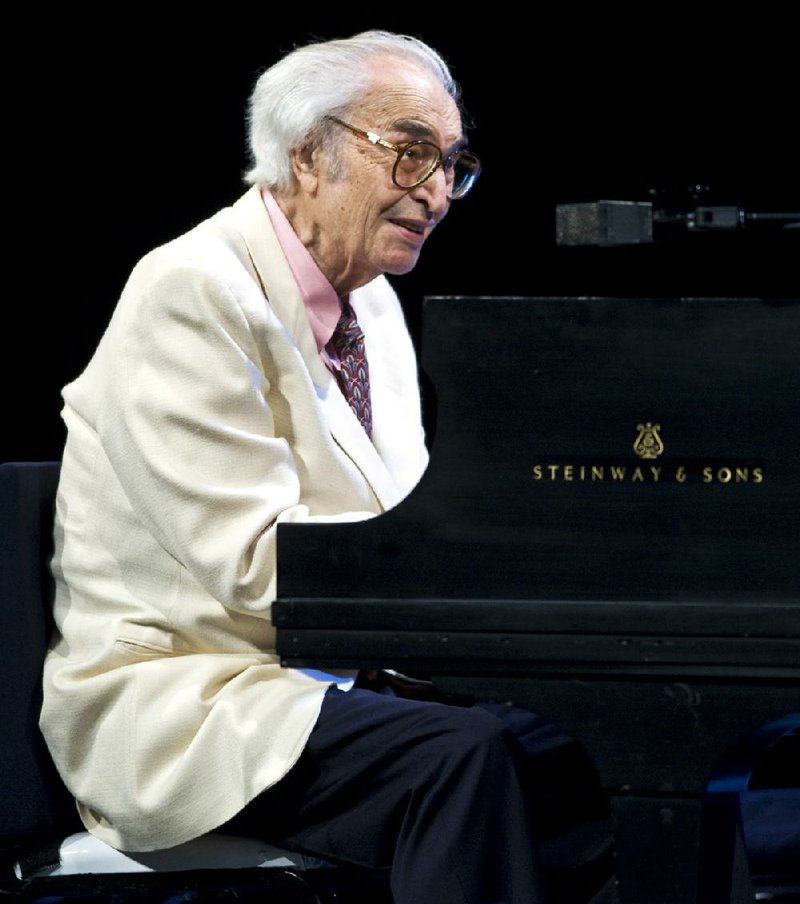LITTLE ROCK — Dave Brubeck, a pianist and composer whose distinctive mixture of experimentation and accessibility made him one of the most popular jazz musicians of the 1950s and ’60s, died Wednesday morning in Norwalk, Conn. He would have turned 92 today.
He died while on his way to a cardiology appointment, Russell Gloyd, his producer, conductor and manager for 36 years, said. Brubeck lived in Wilton, Conn.
In a long and successful career, Brubeck helped repopularize jazz. His quartet’s 1959 recording of “Take Five” was the first jazz single to sell 1 million copies.
Outside of the group’s most famous originals, which had the charm and durability of pop songs (“Time Out,” “Blue Rondo a la Turk,” “It’s a Raggy Waltz”), some of its best work was in its overhauls of standards such as “You Go to My Head,” “All the Things You Are” and “Pennies From Heaven.”
David Warren Brubeck was born on Dec. 6, 1920, in Concord, Calif.
In 1942, he married Iola Whitlock, who he met while attending the College of the Pacific, near Stockton, Calif. He graduated that year and was immediately drafted. For two years he played with the Army band at Camp Haan in Southern California. In 1944, Pvt. Brubeck became a rifleman and was shortly sent to Metz, in eastern France, for further preparation for combat.
When his new commanding officer heard him accompany a Red Cross traveling show one day, Brubeck recalled, he told his aide-de-camp, “I don’t want that boy to go to the front.” Thereafter, Brubeck led a band that was trucked into combat areas to play for the troops.
Finished with the Army at 25, Brubeck moved with his wife into an apartment in Oakland, Calif., and studied at Mills College with the French composer Darius Milhaud.
Brubeck had met his most important musical colleague, Paul Desmond, in an Army band in 1943. Desmond and his alto saxophone were a perfect foil; his delicate, impassive tone was as ethereal as Brubeck’s style was densely chorded. In 1947 they met again and found instant musical rapport.
Brubeck’s first group, an octet formed in 1946, contained five of Milhaud’s students and played pieces influenced by his teachings, using canonlike elements.
In the late 1940s and early ’50s Brubeck also led a trio with Ron Crotty on bass and Cal Tjader on drums. It was around this time that he started to develop an audience. In 1951 the trio expanded to a quartet, with Desmond returning.
By the time of an engagement in Boston in the fall of 1952, Brubeck and Desmond had become one of jazz’s greatest combinations.
In 1954 Brubeck was the first jazz musician to be featured on the cover of Time magazine.In 1958, as part of a State Department program that brought jazz as an offer of good will during the Cold War, his quartet traveled in the Middle East and India, and Brubeck became intrigued by musical languages that didn’t stick to 4/4 time — what he called “march-style jazz,” the meter that had been the music’s bedrock. The result was the album Time Out, recorded in 1959. With the hits “Take Five” (composed by Desmond in 5/4 meter) and “Blue Rondo a la Turk” (composed by Brubeck in 9/8), the album propelled Brubeck onto the pop charts.
Brubeck’s quartet broke up in 1967 after 17 years.
Other collaborations followed, including with his musician sons Darius (a pianist), Chris (a bassist), Dan (a drummer) and Matthew (a cellist). He performed and recorded with them often, most definitively on In Their Own Sweet Way, a Telarc album from 1997. The classic Brubeck quartet regrouped only once, in 1976, for a 25thanniversary tour.
In 2004, he worked with producer Richard Rosenberg, then the artistic director for the Hot Springs Music Festival, on an album for the American Classics imprint.
Brubeck’s son Michael died a few years ago. In addition to his other sons, Brubeck is survived by his wife, Iola; a daughter, Catherine Yaghsizian; 10 grandchildren; and four great-grandchildren.
In 1999 Brubeck was named a Jazz Master by the National Endowment for the Arts. Ten years later he received a Kennedy Center Honor for his contribution to American culture. He gave his archives to his alma mater, now renamed the University of the Pacific.
Despite health problems, Brubeck was still working as recently as 2011.
Information for this article was contributed by Daniel E. Snotnik of The New York Times and Eric Harrison of the Arkansas Democrat-Gazette.
Front Section, Pages 2 on 12/06/2012
